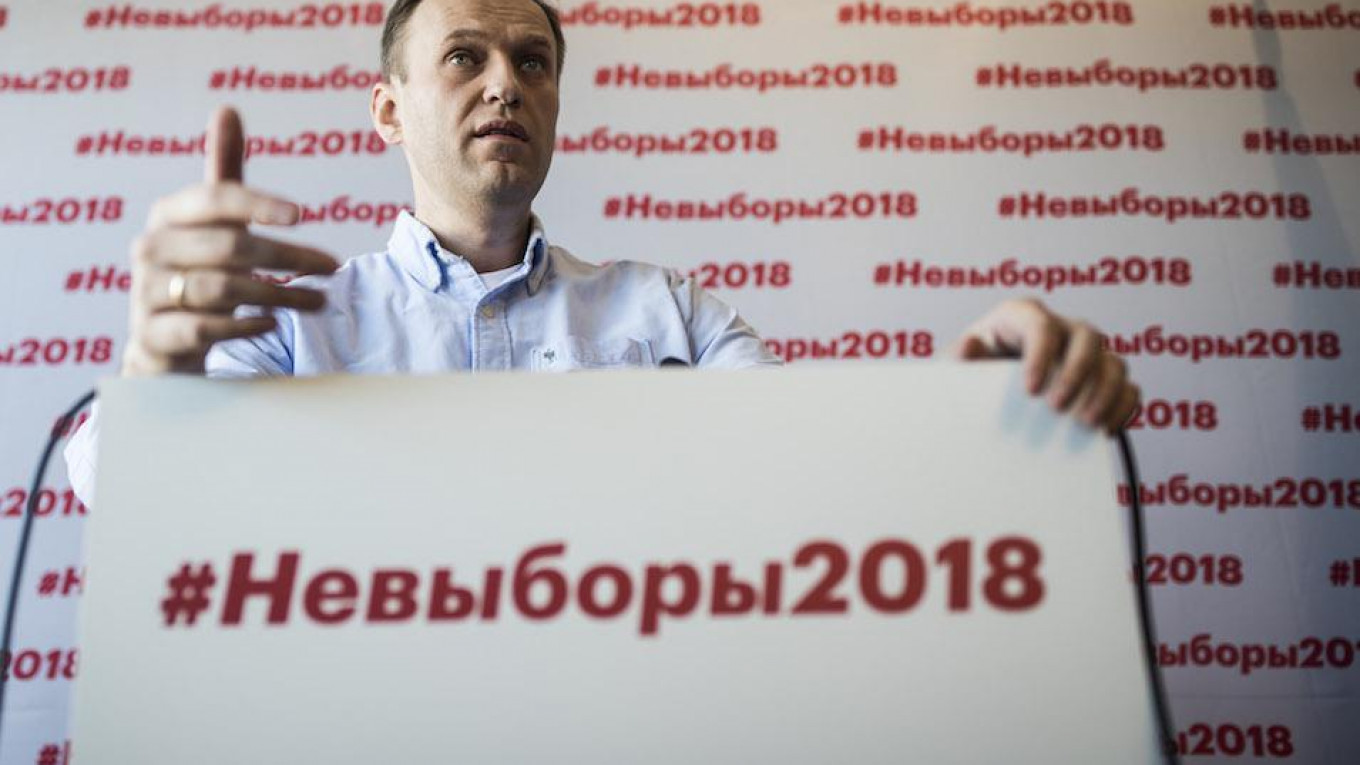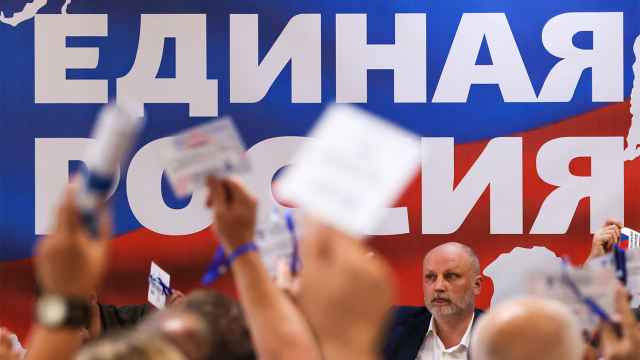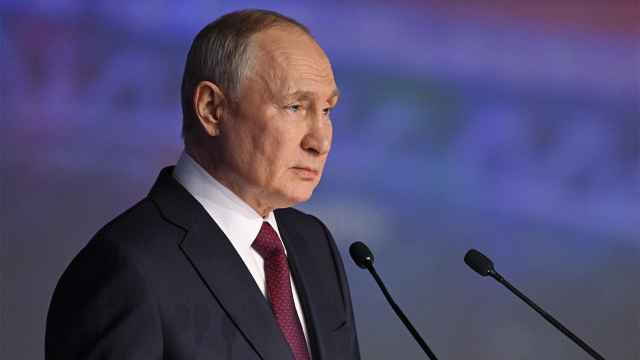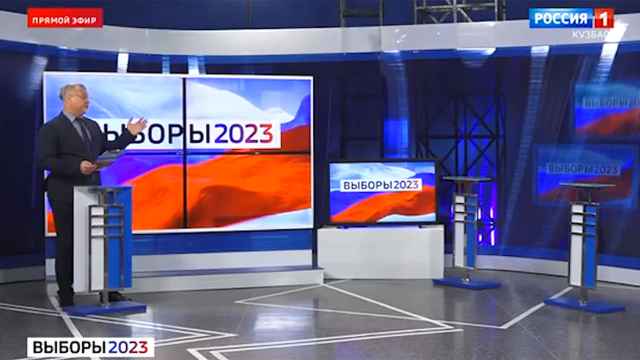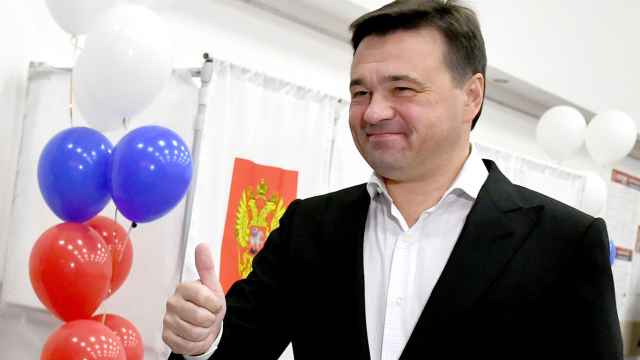Leading Russian opposition figure Alexei Navalny has been hospitalized in serious condition after an alleged poisoning. The Moscow Times published this profile of Navalny in 2018.
Alexei Navalny might have been barred from standing in Russia’s presidential elections on Sunday, but that didn’t mean his team was taking it easy.
“I got here yesterday evening and still I have about an hour left in my shift,” said Vladimir Borisov at 11 a.m. on the morning of the vote.
The 23-year-old volunteer downed an energy drink at the team’s offices in central Moscow before hurrying back to his desk. Nearby, Yulia Zakharova, who had overheard her colleague, laughed. “We don’t know what sleep is anymore.”
The opposition leader’s team in Moscow was busy coordinating more than 33,000 volunteers and staff deployed to towns and cities across the country to track election fraud.
In the open-floor office, a group of sharply dressed staffers, many donning headsets, compiled the incoming reports on laptops, which then appeared on a large digital map of Russia behind them.
“We work faster than the Central Election Commission (CEC),” boasted Ivan Zhdanov, who heads the team’s election observation team.
Even though his name was not on the ballot due to a criminal record which his supporters say is politically motivated, Navalny was still in good spirits.
"I think that what we accomplished was a greater political success than what any of those fake candidates were able to do," he told The Moscow Times during a press briefing. "We have started a real political movement around the country that will continue after the election."
That movement, however, posed no threat to Vladimir Putin on Sunday. Exit polls gave the president more than 70 percent of the vote.
Of Russia’s opposition politicians, Navalny is the only real thorn in the Kremlin’s side. His anti-government demonstrations last March brought thousands onto the streets of more than 80 towns and cities across Russia. When the authorities barred him for running this year because of controversial embezzlement charges, he called on his base to boycott the elections entirely.
In the lead-up, pundits and analysts said voter apathy — not Navalny — was the greater threat to the Kremlin’s aim this year.
Anastasia, a 39-year-old housewife who declined to share her last name, told The Moscow Times outside a supermarket of her decision not to vote. “Doing my groceries and cooking a nice dinner for my family seemed more important,” she said.
To get out the vote — the Kremlin reportedly wanted between 65 and 70 percent turnout — officials spent millions of rubles. They created a carnival-like atmosphere at polling stations, including selfie competitions with prizes like cars and iPhones.
And they mined all possible votes: A polling station was opened in North Korea, for the country’s sole Russian expat, and ballots were flown by helicopter to reindeer herders in the Arctic.
It also was no coincidence that Sunday’s election coincided with the four-year anniversary of Russia’s annexation of Crimea. While the move led to Western uproar and sanctions, it was met with widespread approval among Russians.
In advance of the election, the independent Levada Center pollster found that 70 percent believe the geopolitical move was good for the country. Voters in the Black Sea peninsula, which Putin visited on Wednesday, received medals on Sunday embossed with the words: “With Russia forever.” The Kremlin’s efforts paid off.
But was it a fair win? Throughout Sunday, social media commenters and Navalny’s team tracked reported violations as they came in. In some polling stations, cameras appeared to be set up to hide ballot boxes from view. Others captured voters stuffing boxes. Observers also recorded unregistered voters casting their ballots.
In the days leading up to the vote, and throughout Sunday, Navalny’s team also reported that their observers were detained en route to polling stations.
“We saw today a huge push by the government to increase the turnout, partly as a reaction to Navalny’s boycott campaign,” said Grigory Melkonyats of the election monitoring Golos NGO. “This came with a number of violations, including the blatant stuffing of ballot boxes and the intimidation of independent election observers.”
For the Kremlin, it is a tightrope to navigate: in 2011 and 2012, widespread election fraud brought tens of thousands out onto the street in anti-Kremlin protests.
“We’ll have to wait until Monday to compare this election with 2012,” Melkonyants added, “but it’s already clear that these were not free elections.”
With his victory, Putin extends his rule by another six years, making him the longest-serving Russian leader since Josef Stalin. Many Russian voters, though, see no alternative.
“I voted for Putin,” said Svetlana, 34, who works for a start-up, outside a polling station in northeastern Moscow. “Not because I am pro-Putin, but because I know what to expect from him.”
Svetlana, who declined to provide her last name, told The Moscow Times she was aware of Navalny’s boycott and had considered joining it. But she had also watched the presidential debates, which included episodes like longtime rabble-rouser Vladimir Zhirinovsky calling reality television star turned presidential candidate Ksenia Sobchak a “whore.”
“I was watching the debates, and I thought, ‘Are these the people who are going to rule the country?” Svetlana said.
It is a reaction that some political analysts say sums up the role of “spoiler” candidates in this year’s election — names put forward by the Kremlin whose sole purpose is to split the opposition vote and increase interest in predictable elections.
As if to prove that point, polling stations in Moscow had not yet closed their doors when Sobchak arrived at Navalny’s headquarters unannounced. After he declined in a live broadcast to align with her newly formed opposition party, the two politicians bickered emotionally on air.
If the impromptu debate was anything to go by, Navalny and his team are only digging in their heels for the long-run.
“Our role is to show an objective picture of today’s events for people to then make their own judgment of their validity,” Zhdanov, the head of the election observing team, told The Moscow Times earlier. “If we determine that there have been widespread falsifications and law breaking, then perhaps there will be protests like in 2011.”
“But that,” he added, “is up to the people.”
Maria Tsnompilatze contributed to this report.
A Message from The Moscow Times:
Dear readers,
We are facing unprecedented challenges. Russia's Prosecutor General's Office has designated The Moscow Times as an "undesirable" organization, criminalizing our work and putting our staff at risk of prosecution. This follows our earlier unjust labeling as a "foreign agent."
These actions are direct attempts to silence independent journalism in Russia. The authorities claim our work "discredits the decisions of the Russian leadership." We see things differently: we strive to provide accurate, unbiased reporting on Russia.
We, the journalists of The Moscow Times, refuse to be silenced. But to continue our work, we need your help.
Your support, no matter how small, makes a world of difference. If you can, please support us monthly starting from just $2. It's quick to set up, and every contribution makes a significant impact.
By supporting The Moscow Times, you're defending open, independent journalism in the face of repression. Thank you for standing with us.
Remind me later.



